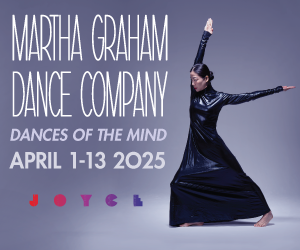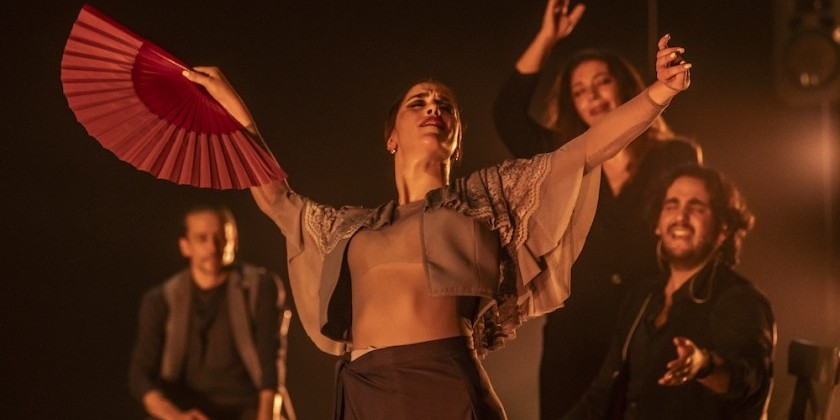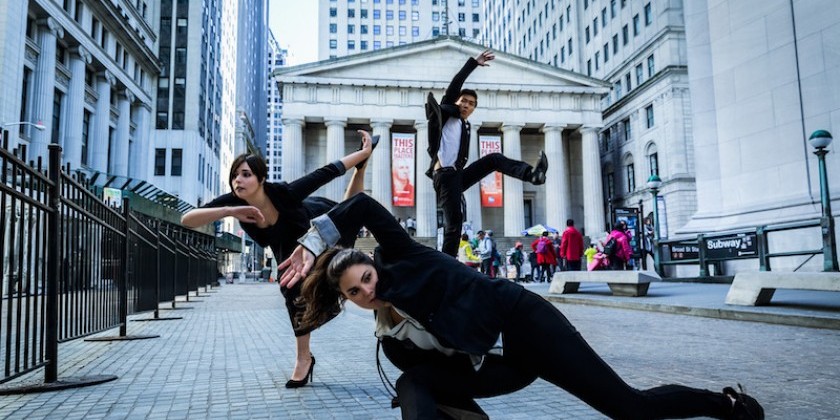IMPRESSIONS: Rovaco Dance Company's "7:1" at The New School's Alvin Johnson/J.M. Kaplan Hall

May 13th, 2017
Choreography: Rohan Bhargava
Music: Zachary Cantron, Alex Chadwell, Yufei Chen, Brian Denu, Stanislav Fridman, Justin Rosin, and Michael Spiroff
Lighting: Hye Jeong Yun
Dancers: Nico Gonzales, Mariel Harris, Jared McAboy, Sean Roel Nederlof, and Hannah Seiden
Pictured above: Jared McAboy and Hannah Seiden in Pendulum
7:1 has its genesis in Alex Chadwell’s desire for old world cafe society camaraderie. Arriving in New York as a composition student at Mannes School of Music, rather than finding this artistic bonhomie, Chadwell encountered “people making love to their electronic devices.” A serendipitous meeting with choreographer Rohan Bhargava blossomed into friendship and dreams of “What would Diaghilev do were he alive today?”.
Matching the choreographic wit of Bhargava with seven commissioned world premieres — all composed by Chadwell’s fellow composition students at Mannes — is their answer. In l’esprit de Diaghilev, a “we-can-do-it” charm permeates this production with the composers providing accompaniment, members of Bhargava’s Rovaco Dance Company dancing, and the entire collective working together to raise funds.
Michael Spiroff’s cello composition for Triple Helix is aurally itchy, with its rapidly brushing strings simulating scratching. How appropriate then that its three dancers swarm around each other in a contortionist-like line that evokes ants hunting for lunch. Just as the sensation to scratch becomes unbearable, the dancers break apart into an athletic canon of one-handed backwards walkovers. Together, they are overwhelming; apart, they are hamsters running on a wheel.

Two bobble-headed dolls pass bodily ripples through each other’s limbs while holding hands. They could be Jack and Jill except our telltale hill is the hump in their relationship. This saucy doll (Hannah Seiden) wants a kiss from her beau (Jared McAboy), but boys just want to have fun. What ensues is a “dance tantrum” with Bhargava converting slaps, flying limbs, and forceful turns that result in McAboy vertically flipping Seiden 180 degrees into a comical tango. Despite her less than innocent intent, Seiden comes off as more petulant than violent. Delightfully – like Yufei Chen’s composition — Pendulum ends with our dolls sharing a smooch.
A wave of bodily progressions becomes a never-ending run of spirals for Nico Gonzales’ improvised solo to Alex Chadwell’s Dream Myself, an improvisation of solo voice and electric guitar on loop. Trisha Brown’s legacy of movement resonates in this sinuously sensual piece. Though it doesn’t go anywhere, it is entrancing to watch.
The sole misfire of the afternoon, What did you say?, finds Mariel Harris responding to Brian Denu’s composition for marimba with bodily twitches for every note played. If there is anything more to the dance, I did not see it.
A creepy mood pervades A Kindred Spirit. A green-dressed girl wants to get away from her affectionate jeans and t-shirt sporting family, but she can’t seem to let go. Seiden's startling dives into penchée arabesque while grasping for and being held back by her family perfectly express her ambivalence. The extended lullaby (Justin Rosin) makes it feel like something untoward might occur at any moment. Nothing does, which frightens me more than if anything had.

Training in Love starts as a militaristic duet for Sean Roel Lendorf and McAboy that expands into an opus on love between men. Their stoic calisthenics grow from individual exhibitions to dancing with each other. While plausible deniability seems to be the rule of their engagement, tenderness creeps into their gestures. Though the movement remains martial, a swell of sound from the piano and trumpet (composed by Zachary Cantron) shifts the perspective as the men grapple with each other like loved ones do. Despite our society’s progress, it is still rare to see men behaving intimately towards each other.
The concert’s strongest musical offering is a solo piano piece masterfully played by the composer Stanislav Fridman. Labyrinth, though, looks like a choreographic sketch. The piece develops a “tag, you do the next move” structure only to return to unison, which then becomes waves of movement in the manner of Hanya Holm, bodies sent flying as if they were walls of wind. Unfortunately, the stage is not large enough to illustrate this effect.
Bhargava is a talented choreographer given to an over-reliance on athletic partnering and forming chains of dancers who grasp for one another before breaking apart. As of yet, his ensemble and solo pieces do not yet contain the level of sophistication found in his pas de deux. Although he possesses a delightful rhythmic responsiveness to music, he has a ways to go in developing his voice; once he finds his message, he will be impossible to ignore.
As producers working in a recital hall that was never meant to house a project of this scale, I greatly admire Chadwell and Bhargava for this seamless production. All they need is a theatre large enough to showcase their talent. Hopefully the next iteration will do precisely that.
The Dance Enthusiast Shares IMPRESSIONS/ our brand of review and Creates Conversation.
Check out our other IMPRESSIONS here.
Share your #AudienceReview of this show or others for a chance to win prizes.














